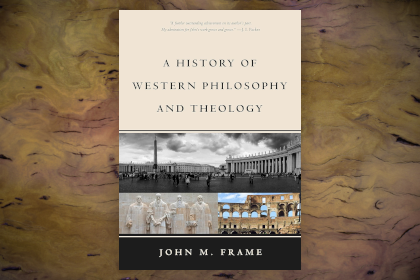Theological Reflections: the Penal Substitutionary Atonement
 Does God allow doctrinal problems in the church so that Christians will study God’s Word carefully and defend it more accurately against unbiblical ideas? Maybe so. There does seem to be some evidence of this in church history. But whether this is true or not, it does seem that several serious doctrinal deviations have arisen in our generation—one after another—even within what has been considered generally conservative Christianity. From the fifties on, evangelicals debated among themselves the doctrine of the inerrancy of the original writings of Scripture. In response to those evangelicals who were arguing that Scripture was not inerrant in the scientific and historical sections of Scripture, the International Council on Biblical Inerrancy was formed in 1977. These biblical scholars planned a ten-year strategy of education, study, and publication. Over the course of ten years, they and others published several important and helpful books, along with the notable Chicago Statement on Biblical Inerrancy. The battle is not over, but much has been accomplished through careful biblical responses to those compromising the doctrine of Scripture.
Does God allow doctrinal problems in the church so that Christians will study God’s Word carefully and defend it more accurately against unbiblical ideas? Maybe so. There does seem to be some evidence of this in church history. But whether this is true or not, it does seem that several serious doctrinal deviations have arisen in our generation—one after another—even within what has been considered generally conservative Christianity. From the fifties on, evangelicals debated among themselves the doctrine of the inerrancy of the original writings of Scripture. In response to those evangelicals who were arguing that Scripture was not inerrant in the scientific and historical sections of Scripture, the International Council on Biblical Inerrancy was formed in 1977. These biblical scholars planned a ten-year strategy of education, study, and publication. Over the course of ten years, they and others published several important and helpful books, along with the notable Chicago Statement on Biblical Inerrancy. The battle is not over, but much has been accomplished through careful biblical responses to those compromising the doctrine of Scripture.
Then around the turn of the century, a new approach to the doctrine of God was submitted by those known as Open Theists. Open Theists argue that God does not have detailed control of the universe and that He does not know for sure the future acts of free moral agents. In the words of Al Mohler writing in the end of the twentieth century: “My argument is that the integrity of evangelicalism as a theological movement, indeed the very coherence of evangelical theology is threatened by the rise of the various new ‘theisms’ of the evangelical revisionists.”1 The ideas of Open Theism have been answered by those in support of the classic doctrine of God,2 and the debate has seemingly quieted just in time for another major doctrinal deviation to be proposed.
Now we are hearing that the penal substitutionary view of the atonement should be replaced by some other theory. Seemingly the left side of the Emerging Church has been in the forefront of this grave development, though there is no unified agreement in what the correct theory is. In fact, some, in typically postmodern style, seem to be arguing that there really is no one model of the atonement that gets to the essence of Christ’s death on the cross. The value of the atonement might depend on each individual’s understanding.3
Other Emergents are proposing the old Moral Influence Theory of the Atonement that argues that what changed at the cross was not God’s attitude toward us, but our attitude toward God. “…Jesus enacted and represented the forgiveness that has always been in the heart of God…. [T]he Atonement is about how our attitude toward God changes as we see forgiveness acted out before us.”4 So, Jesus on the cross shows us how much God loves us, and we are supposed to be thus influenced to feel better about God and love God.
Still others are arguing for the Christus Victor model of the atonement. This view, which was one of the theories in the church of the Middle Ages, was redeveloped in the 1960’s, and is now being promoted by Greg Boyd among others.5 Boyd, previously of Open Theism fame, does not deny penal substitutionary aspects to the atonement, but argues that Christ’s death and resurrection was essentially and primarily about Christ’s victory over Satan. According to Robert Webber, the Christus Victor theory “is becoming more pronounced among younger evangelicals.”6
We at Shepherds Theological Seminary believe that the Penal Substitution view of the atonement describes the reason why Christ died on the cross. This breathtaking biblical doctrine, revived in the Reformation by Luther and Calvin, is called “penal” because there is a penalty that was inflicted at the cross of Christ. Everyone of us has broken God’s law and we are required to face a judicially angry God. But God loves us in that He sent His Son to die on the cross, and wonderfully, Christ’s death propitiated the wrath of God and paid the penalty.
And it is called “substitution” because Christ paid the penalty in our place. We could never have paid the penalty even for ourselves, let alone for anyone else. Our punishment would have been an eternal separation from God in hell. But the God-man could suffer the punishment and pay the penalty for the sins of the world. Scripture says explicitly, “and He [Christ] Himself is the propitiation for our sins; and not for ours only, but also for those of the whole world” (1 John 2:2; cf. Mark 10:45; Acts 20:28; Rom. 5:6, 8; 1 Cor. 6:20; 2 Cor. 5:14, 18-19, 21; Gal. 1:4; 2:20; 3:13; Eph. 1:7; 1 Thess. 5:10; 1 Tim. 2:5-6; Heb. 2:17; 1 Peter 2:24; 1 John 4:10, et. al.). The New Testament Epistles make it crystal clear that penal substitution is the essence of Christ’s death on the cross. This is what we believe, teach, and preach at Shepherds Theological Seminary.
Notes
1 Albert Mohler, “The Eclipse of God at Century’s End,” The Southern Baptist Journal of Theology I (Spring 1997):38.
2 For a defense of the classic doctrine of God, see, for example, Bruce Ware, God’s Lesser Glory (Crossway, 2000).
3 See D. A. Carson’s analysis of Brian McLaren’s The Story We Find Ourselves In, in Carson, Becoming Conversant with the Emerging Church (Zondervan, 2005), 166-67.
4 Dave Tomlinson, The Post-Evangelical (Zondervan, 2003), 101.
5 See Greg A. Boyd, God at War (InterVarsity, 1997), 238-68. See also Boyd’s arguments in The Nature of the Atonement, edited by James Beilby and Paul R. Eddy (InterVarsity, 2006), especially 23-65. This is a four views book.
6 Robert E. Webber, The Younger Evangelicals (Baker, 2002), 251, n.15.
Dr. Larry Pettegrew taught at Pillsbury Baptist Bible College for over 10 years, serving as chairman of both the Christian Education and Bible departments. Following his time at Pillsbury, he served on the faculty of Detroit Baptist Theological Seminary then taught at Central Baptist Theological Seminary for 14 years. After 12 years on the faculty at The Master’s Seminary, Dr. Pettegrew accepted the executive vice presidency of Shepherds Theological Seminary—a position he presently holds in addition to his role as Academic Dean.
- 67 views
I found Driscoll’s approach to be balanced and thoroughly Biblical while holding to truth found in multiple atonement theories. Larry also points out a clear example of a misuse of the various theories as seen in McLaren’s Book, The Story We Find Ourselves In. Anyway, to me the bottom line is that the penal substitutionary theory of the atonement explains our salvation, and appreciating the other theories helps us explore…Maybe what I’m uncomfortable with is mainly how we’re using the term “other theories.” What I mean is that the “other theories” posit a different essence for what the atonement accomplished and why. There is (or at least used to be) a certain exclusivity to them.
So I’m not sure what you’ve described as “Driscoll’s approach” and others is really “appreciating the other theories” so much as fully appreciating all the aspects of the atonement Scripture reveals. Maybe I’m only imagining the difference, but I like crisp lines in this area and “appreciating other theories” gives me the willies.
Anyway, I think we all recognize that none of the other theories is 100% wrong… though we are perhaps also agreed that they are wrong to the degree they put something other than penal substitution at the center/core.
So if that’s “appreciating” them, I guess I’m in, too.
Views expressed are always my own and not my employer's, my church's, my family's, my neighbors', or my pets'. The house plants have authorized me to speak for them, however, and they always agree with me.
Penal substitution deals only, or primarily, with the individual effects of sin and Christ’s atoning work.And there is a reason for this. All of these cosmic and/or corporate issues referred to are subsequent or consequential, not initiative which justifies penal substitution dealing primarily with the individual effects of sin. The disorder of this world, social or natural and the corporate sin, is not the result of its own sin but individual sin. Its subsequent re-order and reconciliation is also consequential with regard to individual reconciliation. That is to say, if there is no reconciliation of man to God there is no reconciliation of any thing in this world of humanity to God but when man is reconciled to God, and he has been, there is a subsequent and consequential re-ordering and reconciliation of all relevant things.
And even the issue of Satan in the Christus Victor model. Christ’s victory over Satan is a consequence of his intended objective in the penal substitution, namely man’s salvation and his individual sin. To place the conflict between Satan and God as the initiating cause is to ignore the ultimate objective and broadly expressed pleasure of God in Scripture regarding Christ’s death which is man’s reconciliation. Now it is true that Satan is a larger element than other elements and may indeed but the largest subsequent to man but his defeat remains subsequent to man’s salvation and the purpose of Christ’s death in proper order. Man is the central objective in the substitution of Christ on the cross, all other issues are subsequent or consequential and without man’s reconciliation there is no reconciliation of the other, hence they are peripheral which is why it is rightly primary.
I believe there is an intensification of the use of rationalism and philosophy in certain schools of theology today that have opened the door for imprecision, obfuscation and acceptance of multiple definitions that ultimately lead to confusion and an elevation of intellectual tolerance to the injury of orthodox discovery and reaffirmation. I believe the misdirection of this doctrine can be traced to that in large part.



Discussion